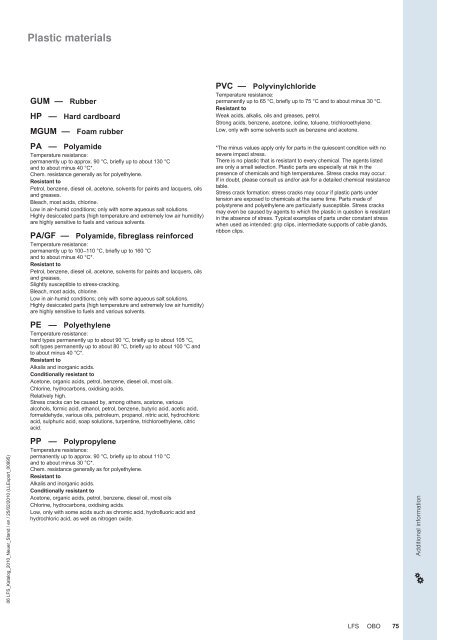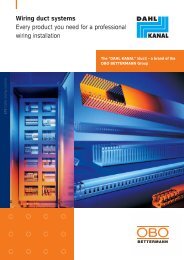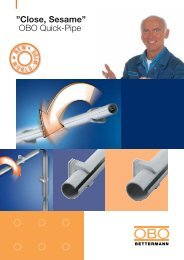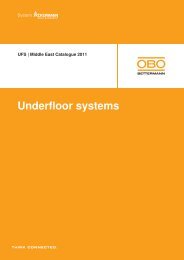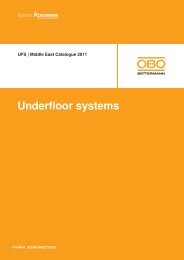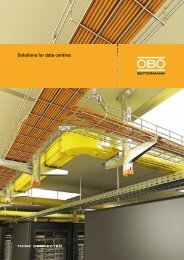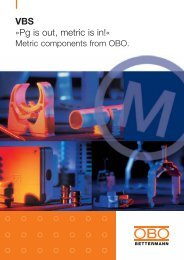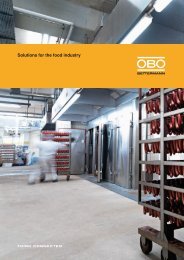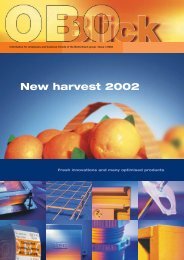LFS | VK wiring trunking system, Dahl - OBO Bettermann
LFS | VK wiring trunking system, Dahl - OBO Bettermann
LFS | VK wiring trunking system, Dahl - OBO Bettermann
You also want an ePaper? Increase the reach of your titles
YUMPU automatically turns print PDFs into web optimized ePapers that Google loves.
Plastic materials<br />
06 <strong>LFS</strong>_Katalog_2010_Neuer_Stand / en / 25/02/2010 (LLExport_00995)<br />
GUM<br />
HP<br />
—<br />
MGUM<br />
PA<br />
—<br />
—<br />
Rubber<br />
Hard cardboard<br />
—<br />
Foam rubber<br />
Polyamide<br />
Temperature resistance:<br />
permanently up to approx. 90 °C, briefly up to about 130 °C<br />
and to about minus 40 °C*.<br />
Chem. resistance generally as for polyethylene.<br />
Resistant to<br />
Petrol, benzene, diesel oil, acetone, solvents for paints and lacquers, oils<br />
and greases.<br />
Bleach, most acids, chlorine.<br />
Low in air-humid conditions; only with some aqueous salt solutions.<br />
Highly desiccated parts (high temperature and extremely low air humidity)<br />
are highly sensitive to fuels and various solvents.<br />
PA/GF<br />
—<br />
Polyamide, fibreglass reinforced<br />
Temperature resistance:<br />
permanently up to 100–110 °C, briefly up to 160 °C<br />
and to about minus 40 °C*.<br />
Resistant to<br />
Petrol, benzene, diesel oil, acetone, solvents for paints and lacquers, oils<br />
and greases.<br />
Slightly susceptible to stress-cracking.<br />
Bleach, most acids, chlorine.<br />
Low in air-humid conditions; only with some aqueous salt solutions.<br />
Highly desiccated parts (high temperature and extremely low air humidity)<br />
are highly sensitive to fuels and various solvents.<br />
PE<br />
—<br />
Polyethylene<br />
Temperature resistance:<br />
hard types permanently up to about 90 °C, briefly up to about 105 °C,<br />
soft types permanently up to about 80 °C, briefly up to about 100 °C and<br />
to about minus 40 °C*.<br />
Resistant to<br />
Alkalis and inorganic acids.<br />
Conditionally resistant to<br />
Acetone, organic acids, petrol, benzene, diesel oil, most oils.<br />
Chlorine, hydrocarbons, oxidising acids.<br />
Relatively high.<br />
Stress cracks can be caused by, among others, acetone, various<br />
alcohols, formic acid, ethanol, petrol, benzene, butyric acid, acetic acid,<br />
formaldehyde, various oils, petroleum, propanol, nitric acid, hydrochloric<br />
acid, sulphuric acid, soap solutions, turpentine, trichloroethylene, citric<br />
acid.<br />
PP<br />
—<br />
Polypropylene<br />
Temperature resistance:<br />
permanently up to approx. 90 °C, briefly up to about 110 °C<br />
and to about minus 30 °C*.<br />
Chem. resistance generally as for polyethylene.<br />
Resistant to<br />
Alkalis and inorganic acids.<br />
Conditionally resistant to<br />
Acetone, organic acids, petrol, benzene, diesel oil, most oils<br />
Chlorine, hydrocarbons, oxidising acids.<br />
Low, only with some acids such as chromic acid, hydrofluoric acid and<br />
hydrochloric acid, as well as nitrogen oxide.<br />
PVC<br />
—<br />
Polyvinylchloride<br />
Temperature resistance:<br />
permanently up to 65 °C, briefly up to 75 °C and to about minus 30 °C.<br />
Resistant to<br />
Weak acids, alkalis, oils and greases, petrol.<br />
Strong acids, benzene, acetone, iodine, toluene, trichloroethylene.<br />
Low, only with some solvents such as benzene and acetone.<br />
*The minus values apply only for parts in the quiescent condition with no<br />
severe impact stress.<br />
There is no plastic that is resistant to every chemical. The agents listed<br />
are only a small selection. Plastic parts are especially at risk in the<br />
presence of chemicals and high temperatures. Stress cracks may occur.<br />
If in doubt, please consult us and/or ask for a detailed chemical resistance<br />
table.<br />
Stress crack formation: stress cracks may occur if plastic parts under<br />
tension are exposed to chemicals at the same time. Parts made of<br />
polystyrene and polyethylene are particularly susceptible. Stress cracks<br />
may even be caused by agents to which the plastic in question is resistant<br />
in the absence of stress. Typical examples of parts under constant stress<br />
when used as intended: grip clips, intermediate supports of cable glands,<br />
ribbon clips.<br />
Additional information<br />
<strong>LFS</strong><br />
<strong>OBO</strong><br />
75


